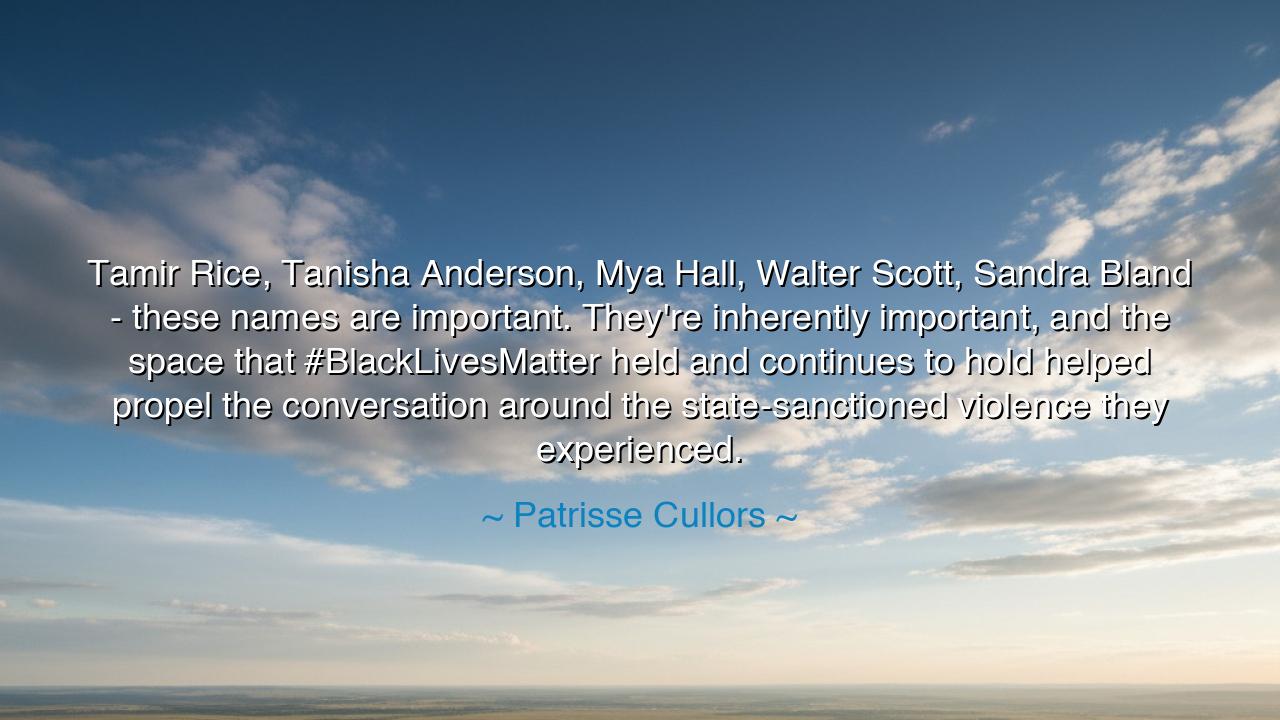
Tamir Rice, Tanisha Anderson, Mya Hall, Walter Scott, Sandra
Tamir Rice, Tanisha Anderson, Mya Hall, Walter Scott, Sandra Bland - these names are important. They're inherently important, and the space that #BlackLivesMatter held and continues to hold helped propel the conversation around the state-sanctioned violence they experienced.






Hear, O listener, the solemn cry of Patrisse Cullors: “Tamir Rice, Tanisha Anderson, Mya Hall, Walter Scott, Sandra Bland—these names are important. They’re inherently important, and the space that #BlackLivesMatter held and continues to hold helped propel the conversation around the state-sanctioned violence they experienced.” These words are not mere remembrance, but invocation. They call forth the names of the fallen, proclaiming that each life mattered, that each was sacred, that each stands as testimony against a society where justice was denied.
To speak a name is to keep a life from silence. The child Tamir Rice, slain for holding a toy gun; Tanisha Anderson, who died while in the hands of those sworn to protect; Mya Hall, a Black trans woman whose life was ended too soon; Walter Scott, shot as he fled from a traffic stop; Sandra Bland, whose death in custody still haunts the conscience of the nation. These names are more than tragedies—they are mirrors held to the soul of America, reflecting the violence that society tolerates when it looks away from the suffering of its most vulnerable.
Cullors declares that these names are inherently important—not because of what they might have achieved, not because of wealth or fame, but because every human life is sacred, valuable, and irreducible. In a culture that often measures worth by power or success, her words remind us that dignity is not earned but innate. To forget these names would be to forget this truth, and to forget this truth would be to lose sight of justice itself.
Consider, O listener, the story of the civil rights movement of the 1960s. Then, too, names carried weight: Emmett Till, lynched in his youth, became a rallying cry for a people demanding justice. His death, like the names Cullors speaks, was not only personal sorrow but public testimony. The movement grew stronger not by abstract principles alone, but by remembering faces, voices, and stories—by insisting that those lost to hatred and violence would not be erased.
The space held by #BlackLivesMatter is like the sanctuary of old, where the oppressed could gather their grief and their strength. It is a fire in the public square, reminding all who pass that silence is complicity, and remembrance is resistance. By creating this space, the movement transforms mourning into momentum, sorrow into speech, and remembrance into resolve. This is what Cullors means: that in the act of honoring the fallen, we compel the world to reckon with the injustice that ended their lives.
The lesson is heavy, yet it is also a torch: never let the names of the fallen be forgotten. Speak them, write them, carry them. Let them echo across generations, not as mere victims, but as teachers, urging us toward a more just and compassionate society. For the measure of civilization is not in its monuments, but in whether it remembers its lost and protects the living from meeting the same fate.
So I say to you, O child of tomorrow: when you hear these names—Tamir, Tanisha, Mya, Walter, Sandra—let your heart not grow numb but aflame. Let their memory guide your choices: to stand against injustice, to defend the vulnerable, to insist that every life is sacred. For Cullors has spoken truly: the act of remembering is itself an act of revolution, and in remembrance, we find the strength to build a world where no name need be added to such a list again.






AAdministratorAdministrator
Welcome, honored guests. Please leave a comment, we will respond soon